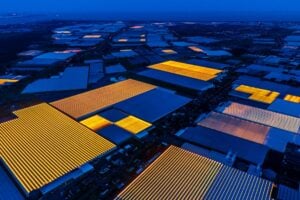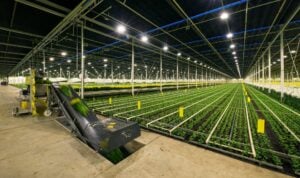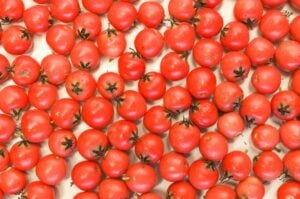AgTech Ecosystem Thrives in the Netherlands
How Agtech accelerates solutions from food companies based the Netherlands
As a world leader in food and agriculture technology, the Netherlands has been intrinsically linked to the agfood industry for centuries. As it is a small country, limited in the land it can cultivate, sustainable food innovation has always been high on the agenda.
Wherever you look, the Netherlands is pioneering the shift towards agtech development. Companies at the frontier of food and agriculture are developing new technologies, from sensor technology, digital technology, robotic technology and biotechnology for plant breeding and sustainable plant health. In many cases, solutions entail a combination of technologies.
These efforts are in the context of a world food system which is confronting a series of increasingly urgent challenges, across areas such as sustainability, efficiency and food security. The Dutch are preparing for the future with innovative solutions to the challenges that the agricultural industry faces.
A leader across the industry
So what makes the agrifood industry in the Netherlands special today? The facts give us some indication. As a world leader in agrifood and agtech innovation, the country is 2nd in global agrifood exports, is home to production and R&D operations of the largest top 10 agrifood companies in the world. It also has the world’s number one agrifood university, Wageningen University and Research (WUR), and is targeting global circular agriculture leadership by 2023. Whilst WUR leads as an agriculture university, there is a significant ecosystem of universities and research centres which compliment agtech’s academic and R&D space, driving collaboration which further enriches the sector.
It’s clear that, whilst small, the Netherlands punches above its weight, or bears fruit beyond its size. Having created some of the most cutting-edge methods available to feed its population, it is widely seen as a circular agri-economy pioneer and a powerhouse of food innovation. The Netherlands’ worldwide reputation for innovation in agtech is bolstered by the scale of the Government’s R&D spend on the sector. The Netherlands spends 5% of its R&D expenditure, or €1 billion, per year on horticulture.
A focus on innovation and collaboration
The Netherlands’ strides in agtech are down to how the country is a hub for innovation and collaboration. With a desire to collaborate through searching for synergy and complementary solutions, the Netherlands demonstrates that partnerships in agtech drive positive solutions.
This is down to the clear triple helix commercial-academia-government approach. So, whether businesses are in smart horticulture, smart logistics and circularity, indoor farming, knowledge transfer and trade – or another vital element of the agrifood chain – companies find a deep respect for cooperation.
Examples of this approach include AI for Agro-Food lab. This lab is a collaboration of 4TU (the four universities of technology in The Netherlands) and OnePlanet Research Center in cooperation with 11 industry partners. The aim of the lab is to evolve a new generation of ecology-based sustainable agricultural production systems that are supported and enhanced by artificial intelligence. Likewise, RoboCrops, is a public-private initiative that helps horticulture companies progress towards hands-free growing, by offering subsidized workshops, bootcamps and networking events to solve every day practical problems through.
The Farm of the Future is also a brilliant example of international cooperation on climate-smart farming. This hub features best practices and techniques related to agronomy, ecology and technology. These are a handful initiatives in a large group which are driving forward innovation in the agtech space in the Netherlands, and reaping the benefits of collaboration and cooperation.
New horizons for agtech
In this environment, technology providers are at the forefront of creating solutions that are answering many of modern society’s challenges. With an ability to monitor crop growth and disease more efficiently than the human eye (and at a much higher speed), for example, robots and data systems have the potential to optimize farming throughout the agriculture and horticulture industries.
One such nascent technology that is already playing a part is Artificial intelligence (AI). AI-driven software and hardware has the potential to replicate human behaviour such as learning and problem solving. Robots are already used in many industries, including manufacturing and automobile production — filling the need for greater precision and safety while increasing labour productivity.
Technology providers in the Netherlands are at the forefront of creating solutions that answer many of modern society’s challenges in this area. RoboValley at Delft University of Technology provides space for companies to explore new ideas in AI and robotics. Researchers from TU Delft’s MAVLab have been developing swarms of tiny drones with the capability of mapping out difficult to explore areas — an ability which could have widespread applications, including the surveillance of buildings, emergency services and even the regulation of agricultural crops.
Spaces for innovation
The spaces for innovation in which R&D can be conducted for these nascent technologies, and those to drive greater efficiency and sustainability of agriculture and horticulture, are numerous. The depth of expertise and innovation is evident across the Netherlands’ field labs and research centers, where testing and validation activities takes place.
Tomato World for example, based in Westland, is an experience center and a field lab for data-driven cultivation of tomatoes. Founded in 2008 by growers, seed propagators, greenhouse builders and the local municipality, it aims to demonstrate the sector’s significant contributions to addressing global food challenges. As a field lab, the center brings together over 30 leading companies in the horticulture industry, highlighting the collaborative spirit and technological prowess that define Dutch horticulture.
Applied research in horticulture
Delphy Greenhouse Horticulture, based in various locations around the Netherlands is conducting applied research to develop new cultivation techniques, crop protection methods, and sustainability practices. This involves experimentation with various plant varieties, growth conditions and technologies to enhance productivity and efficiency.
The greenhouse horticulture sector is also being advanced in the Netherlands, with WUR in Bleiswijk providing a leading example. For example, Hoogendoorn Growth Management, which creates sustainable and user-friendly process automation solutions for growers, works closely with WUR. Here, WUR and Hoogendoorn Growth Management have collaborated at the Unifarm greenhouses of WUR, which serves as a center for the cultivation of genetically modified plants and conducting critical quarantine research.
What sets Unifarm apart are its innovative under-pressure and over-pressure systems, strategically designed to contain diseases within the compartments and prevent them from infiltrating from the outside. This is amongst a range of companies focused on pushing horticulture innovation forward at WUR.
The satellite location also offers a range of research capabilities linking academic fundamental research to applied horticulture. Next, they innovate their research and network models. For example, the annual ‘Autonomous Greenhouse Challenge’ pushes the boundaries of autonomous growing, whilst their Club of 100 facilitates a connection between research and 100 leading companies in the industry.
Conducting cutting-edge research on various aspects of greenhouse horticulture, including plant physiology, crop management, climate control, pest and disease management and sustainable practices. This research aims to improve the efficiency, productivity and sustainability of greenhouse operations.
Creative and sustainable solutions
The Netherlands is shaping the future of farming and horticulture worldwide. Dutch farmers have had the highest production per hectare for decades. On top of its production output, the country is also demonstrating that it remains on the cutting edge when it comes to agtech innovation.
To watch a video how the Netherlands is growing agtech innovations and farming for the future to provide creative and sustainable solutions to feed the world, see our latest video here.
1 August 2024

